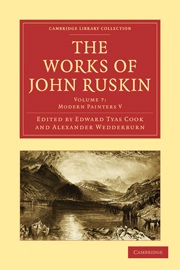Book contents
- Frontmatter
- Contents
- LIST OF ILLUSTRATIONS
- INTRODUCTION TO THIS VOLUME
- BIBLIOGRAPHICAL NOTE
- Modern Painters, Vol. V.
- PREFACE
- PART VI “OF LEAF BEAUTY”
- PART VII “OF CLOUD BEAUTY”
- PART VIII “OF IDEAS OF RELATION:—FIRST, OF INVENTION FORMAL”
- PART IX “OF IDEAS OF RELATION:—SECOND, OF INVENTION SPIRITUAL”
- CHAP. I THE DARK MIRROR
- CHAP. II THE LANCE OF PALLAS
- CHAP. III THE WINGS OF THE LION
- CHAP. IV DÜRER AND SALVATOR
- CHAP. V CLAUDE AND POUSSIN
- CHAP. VI RUBENS AND CUYP
- CHAP. VII OF VULGARITY
- CHAP. VIII WOUVERMANS AND ANGELICO
- CHAP. IX THE TWO BOYHOODS
- CHAP. X THE NEREID'S GUARD
- CHAP. XI THE HESPERID ÆGLÉ
- CHAP. XII PEACE
- EPILOGUE (1888)
- APPENDIX
- Plate section
CHAP. V - CLAUDE AND POUSSIN
Published online by Cambridge University Press: 07 September 2011
- Frontmatter
- Contents
- LIST OF ILLUSTRATIONS
- INTRODUCTION TO THIS VOLUME
- BIBLIOGRAPHICAL NOTE
- Modern Painters, Vol. V.
- PREFACE
- PART VI “OF LEAF BEAUTY”
- PART VII “OF CLOUD BEAUTY”
- PART VIII “OF IDEAS OF RELATION:—FIRST, OF INVENTION FORMAL”
- PART IX “OF IDEAS OF RELATION:—SECOND, OF INVENTION SPIRITUAL”
- CHAP. I THE DARK MIRROR
- CHAP. II THE LANCE OF PALLAS
- CHAP. III THE WINGS OF THE LION
- CHAP. IV DÜRER AND SALVATOR
- CHAP. V CLAUDE AND POUSSIN
- CHAP. VI RUBENS AND CUYP
- CHAP. VII OF VULGARITY
- CHAP. VIII WOUVERMANS AND ANGELICO
- CHAP. IX THE TWO BOYHOODS
- CHAP. X THE NEREID'S GUARD
- CHAP. XI THE HESPERID ÆGLÉ
- CHAP. XII PEACE
- EPILOGUE (1888)
- APPENDIX
- Plate section
Summary
§ 1. It was stated in the last chapter that Salvator was the last painter of Italy on whom any fading trace of the old faithful spirit rested. Carrying some of its passion far into the seventeenth century, he deserved to be remembered together with the painters whom the questioning of the Reformation had exercised eighty years before. Not so his contemporaries. The whole body of painters around him, but chiefly those of landscape, had cast aside all regard for the faith of their fathers, or for any other; and founded a school of art properly called “classical,” of which the following are the chief characteristics.
§ 2. The belief in a supreme benevolent Being having ceased, and the sense of spiritual destitution fastening on the mind, together with the hopeless perception of ruin and decay in the existing world, the imagination sought to quit itself from the oppression of these ideas by realizing a perfect worldly felicity, in which the inevitable ruin should at least be lovely, and the necessarily short life entirely happy and refined. Labour must be banished, since it was to be unrewarded. Humiliation and degradation of body must be prevented, since there could be no compensation for them by preparation of the soul for another world. Let us eat and drink (refinedly), for to-morrow we die, and attain the highest possible dignity as men in this world, since we shall have none as spirits in the next.
- Type
- Chapter
- Information
- The Works of John Ruskin , pp. 315 - 325Publisher: Cambridge University PressPrint publication year: 2010First published in: 1903



